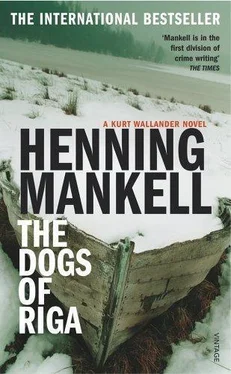The waitress approached, and Lippman ordered a cup of tea. He was so excessively polite that Wallander suspected he had endured many humiliations in his life.
"I'm most grateful that you came," Lippman said quietly. Wallander had to lean forward in order to hear what he was saying.
"You didn't give me any choice," he said. "First a letter, then a telephone call. Maybe you should start by telling me who you are."
Lippman shook his head. "Who I am is of no significance. You are the important one, Mr Wallander."
"No," Wallander said, feeling himself getting annoyed again. "You must understand that I've no intention of listening to what you've got to say if you're not even prepared to confide in me who you are."
The waitress arrived with the tea, and they waited until they were alone again.
"My role is merely that of organiser and messenger," Lippman said. "Who wants to know the name of the messenger? It doesn't matter. We are meeting here tonight, and then I shall disappear. We will probably never meet again. The important thing, therefore, is not confiding in you, but practical decisions. Security is always a practical matter. In my view the business of trust is also a practical matter."
"In that case we might just as well conclude the conversation straight away" Wallander said.
"I've got a message for you from Baiba Liepa," Lippman said hastily. "Don't you even want to hear that?"
Wallander relaxed. He observed the man sitting opposite him, strangely hunched up, as if his health were so fragile he might collapse any moment.
"I don't want to hear anything until I know who you are," he said eventually. "It's as simple as that."
Lippman took off his glasses and carefully poured some milk into his tea.
"I'm merely thinking of your own best interests, Mr Wallander," Lippman said. "In this day and age it's often best to know as little as possible."
"I've been to Latvia," Wallander said. "I've been there, and I think I know what it is to be constantly under observation, forever being checked. But we're in Sweden now, not Riga."
Lippman nodded pensively. "You may be right," he said, "Perhaps I am an old man who can no longer discern how reality is changing."
"A nursery," Wallander said, in an attempt to help him out. "I don't suppose they have always been like they are now?"
"I came to Sweden in the autumn of 1941," Lippman said, stirring his tea. "I was a young man then, and I had the naive ambition of becoming an artist, a great artist. It was freezing cold as dawn broke and we caught sight of the Gotland coast. That was the moment we knew we'd made it, despite the fact that the boat had sprung a leak and several of my companions on board were seriously ill.
We were undernourished, we had tuberculosis. Nevertheless, I have a clear memory of that freezing cold dawn. It was the beginning of March, and I made up my mind I was going to paint a picture of the Swedish coast that would symbolise freedom. That's what it might look like, the gates of paradise. Cold and frozen, a few black cliffs barely visible through the mist. But I never did paint that picture. I became a gardener instead. Now I make a living by suggesting appropriate decorative plants for various Swedish firms. I've noticed how people, and especially people working for the new information technology companies, have an insatiable need to hide their machines among green plants. I shall never paint that picture of paradise. I'll just have to make do with the fact that I've seen it. I know paradise has many gates, just as hell does. One has to learn to distinguish between them, or one is lost."
"And that is something Major Liepa could do?" Lippman did not react to Wallander's mention of the major.
"Major Liepa knew what the gates looked like," he said, "but that's not why he had to die. He died because he had seen who was going in and out through those gates. People who are afraid of the light, because the light makes them visible to people like Major Liepa."
Wallander had the impression that Lippman was a deeply religious man. He expressed himself like a priest standing before a congregation.
"I have lived the whole of my life in exile," Lippman continued. "For the first ten years, until the middle of the 1950s, I believed I would one day be able to return to my home country. Then came the interminable 1960s and 70s, when I'd completely given up hope. Only very ancient
Latvians living in exile, only the really old and the really young and the really mad Latvians believed the world would change so that we might one day be able to return to our homeland. They believed in a dramatic turning point, while I was expecting a long drawn-out conclusion to the tragedy that even then seemed to be complete. But very suddenly things began to happen. We received mysterious reports from our homeland, optimistic reports. We saw the gigantic Soviet Union beginning to tremble, as if some latent fever had at last begun to take hold. Could it really be that what we had never dared to believe might actually happen? We still don't know the answer to that question. We realise that we might yet again be tricked out of our freedom. The Soviet Union is weakened, but that could be a temporary condition. We do not have much time at our disposal. Major Liepa knew that, and that is what drove him on."
"We?" Wallander said. "Who are we?"
"All Latvians in Sweden belong to an organisation," Lippman answered. "We have joined various organisations as a substitute for our lost homeland. We have tried to help people retain their culture, we have constructed various lifelines, we have established foundations. We have listened to cries for help and we have attempted to respond to them. We have fought constantiy to avoid being forgotten. Our exile organisations have been our way of replacing the cities and villages we have lost."
The glass door opened and a man entered. Lippman reacted immediately. Wallander recognised the man – his name was Elmberg and he was the manager of one of the local petrol stations.
"There's no cause for alarm," he said. "That man hasn't hurt a fly since the day he was born. I doubt if he's ever given a thought to the existence of Latvia. He's the manager of a petrol station."
"Baiba Liepa has sent a cry for help," Lippman said. "She is asking that you to come. She needs your assistance."
He took an envelope from his inside pocket. "From Baiba Liepa," he said. "For you."
Wallander took the envelope. It was not sealed, and he carefully extracted the thin writing paper. Her message was brief, and written in pencil, as if in a hurry.
There is a testimony and a guardian, she had written, but I’m afraid I shall be unable to discover the right place on my own. Trust the messenger as you once trusted my husband, Baiba.
"We can supply everything you need in order to get to Riga," Lippman said when Wallander put the letter down. "You can hardly make me invisible!" "Invisible?"
"If I go to Riga I must become somebody new. How will you manage that? How can you guarantee my safety?"
"You will have to trust us, Mr Wallander. But we don't have much time."
Wallander could see that Lippman was anxious. He tried to convince himself that none of what was happening all around him was real. But he knew that this was what the world was like. Baiba Liepa had made one of the thousands of cries for help that are constantly sent across continents. This one was meant for him, and he was obliged to answer.
"I've requested leave from Thursday onwards," he said. "Officially I'm going skiing in the Alps. I can be away for just over a week."
Lippman slid his cup to one side. His weak, melancholy expression had been replaced by fierce determination.
"That's an excellent idea," he said. "Naturally, a Swedish police officer goes to the Alps every winter to try his luck on the piste. What route are you travelling?"
Читать дальше












